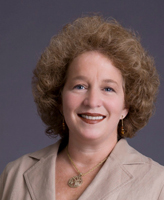
Nancy Ruscheinski, chief innovation officer and global vice chair at Edelman—the world’s largest public relations firm—returned to the University of Notre Dame recently to deliver an unlikely message to undergraduates: it’s okay to not have a plan for your future right away.
Ruscheinski ’84 gave the keynote speech at the College of Arts and Letters career fair, where she recalled her own undergraduate experience as an American Studies major.
“I wanted to pursue a wide variety of interests,” she says. “I didn’t have any idea what I wanted to do, outside of the beginning stirring of interest in advertising and journalism.”
As an Arts and Letters student, Ruscheinski says, she explored a broad range of interests while developing a versatile—and valuable—skill set. “I learned how to be a critical thinker, how to be more interested in news and politics. I’d always liked performing and public speaking, but I think I got to really develop a passion for writing.
“I didn’t realize at the time that those are the skills I would need in public relations, “ she says, “but they’ve served me very, very well.”
Pursuing a Passion
A liberal arts education isn’t just about the skills you’ve acquired, Ruscheinski says.
“It’s about the knowledge you’ve gained. Skills aren’t power; knowledge is power—knowledge of people, history and culture, philosophies and systems, and knowledge about the interconnectedness of the world today.”
Ruscheinski’s own career arc is a testament to the potent combination of enthusiasm, knowledge, and practical career skills Arts and Letters students cultivate.
It was during her senior year, while taking a journalism class with Professor Robert Schmuhl, that Ruscheinski first learned about public relations. Intrigued by the idea of managing corporate reputations and using persuasive writing, she began investigating employment opportunities.
“I pursued interests that were appealing to me. The right career will find you if you pursue what you love,” Ruscheinski says, “and a Notre Dame education is an asterisk in any setting.”
Three years after her graduation from Notre Dame, Ruscheinski began working at Edelman and she has never looked back. “I get to work for an incredibly diverse range of companies and brands. I get to use every skill that I have. I get to be creative, and I get to work with really smart people and tackle weighty issues.”
Embracing Change
At Edelman, Ruscheinski launched the innovative digital division in 1995, right at the cusp of the Internet revolution. This division has since grown to a 700-person global “agency within an agency.”
A rising star in the company, she ran the Chicago headquarters for seven years, served as the company’s U.S. president and chief operating officer for three, and now wears three hats—chief innovation officer, vice chair of client engagement, and global vice chair—which allows her to travel the world working with international clients.
Most importantly, says Ruscheinski, she loves her job. “I haven’t been bored for one minute in 25 years.
“My journey at Edelman has involved plenty of change and adaptability along the way,” Ruscheinski says. “I’ve had to master a wide range of subjects, and quickly consume and synthesize vast amounts of information. But the type of education I received here—that liberal arts sensibility—offered an ideal training ground and prepared me beautifully.”
Positioned to Succeed
Students coming out of Notre Dame’s College of Arts and Letters are well positioned to succeed in the current economy, Ruscheinski says. “The job market is much more competitive now, but you are coming out at an incredible time when they are many new opportunities.
“The world is so desperate for creative problem solvers, critical thinkers, people who are savvy and care about causes and purpose.”
In fact, says Ruscheinski, passion is the most valuable distinguishing feature of liberal arts graduates. “Employers don’t all see medieval studies or gender studies as impractical coursework; 21st century employers know that passionate interests lead to passionate employees.
“And passionate, socially savvy employees are very good for business.”


